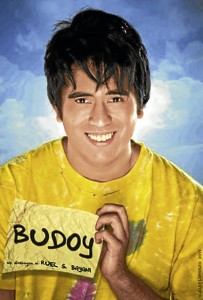Two takes on Gerald Anderson
First, the good news. Fave young actor Gerald Anderson is having his best year yet: Not only is he top-billing his own teleserye, “Budoy,” but he’s also sharing above-the-title credits with popular singer-actress Sarah Geronimo in their current starrer on the big screen.
On “Budoy,” which has been telecasting for some months now, Gerald plays the offbeat (for local screen hunks) role of a mentally challenged youth who’s rejected by his wealthy parents and who grows up with his impoverished but loving surrogate mother.
At the series’ start, the lead actor’s portrayal felt rather unfocused, as he sometimes had problems looking and sounding believable as a retardate. The “sound” part of the problem was more pronounced, since the actor sometimes talked too glibly for the character.
Of late, however, Gerald appears to be more confident and consistent in his depiction of Budoy. This was recently vivified by his controlled and competent handling of a difficult moment in his character’s life, when he was first told of his true parentage.
To his credit, the young actor, obviously guided by his director, avoided most of the temptations to milk the extended scene for all of the turgid and perfervid melodramatic highlights it offered.
Instead of weeping and protesting and ululating all over the place to win an acting award at year’s end, he simply listened—with the limited comprehension his character had—as the people around him finally unveiled the truth.
Only after they had finally fallen silent did the light come back to his eyes, and, in his affectingly childlike way, he smiled and laughed and exulted in how, finally, he was experiencing how it felt to be truly at peace with who he really was.
On the other hand, Gerald’s performance in his current hot film, “Won’t Last a Day Without You,” comes off as too mired in the acting cliches and expectations of old to do his stellar career much good.
Yes, it’s sometimes entertaining and even touching, and the actor’s portrayal evinces a measure of growth; but, taken as a whole, it isn’t a step forward, it’s a step in place—which, in show biz, actually means a step back, since the competition can’t be expected to stay in place, either.
That’s the problem with “for the fans” flicks that are made mostly for the kilig feeling. After you make your teenybooper fans shiver and squeal and scream on cue, what are you and they left with? Not all that much, since it’s all been done before.
So, what do you do for an encore? Again, not much, since the parameters you’ve set have been too constricted and constricting to make room for sufficiently new inputs.
Thus, acting careers based on the fan and kilig factors harbor the seeds of their own self-cooption.
Aside from that, the stars involved aren’t allowed to grow; they just traverse the same profitable territory a second, third or fourth time until it stops being profitable—because the fans, who are older and wiser now, refuse to continue paying new money for ukay-ukay goods.
So, stars like Gerald Anderson should read the handwriting on the wall—and move on. The kilig factor is no longer the way to go.

